Are you looking to improve how your organization manages training and development?
This guide offers everything you need to know about Enterprise Learning Management Systems (LMS).
We will explore their key features and benefits, highlighting five platforms to watch in 2026.
How can you provide consistent and scalable training to hundreds or even thousands of employees, partners or customers? Enterprise Learning Management Systems (LMS).
Industry studies project that the LMS market will experience impressive annual compounded growth of 17.39% through 2030.
In this Blog, we’ll outline what an LMS is, its key benefits and the top enterprise learning platforms for 2026.
Are you ready to improve the training and development efforts at your organization?
Let’s dive right in!
5 Best Enterprise Learning Management System (LMS)
1. Cornerstone LMS: Best for Companies with complex compliance training needs.
2. Saba LMS: Best for Organizations focusing on career development and employee retention.
3. Docebo LMS: Best for Companies looking for a modern, AI-driven LMS.
4. SAP Litmos LMS: Best for Companies focusing on training efficiency and branding.
5. Talent LMS: Best for Companies that need simple and user-friendly learning tools.
Table of contents
- 5 Best Enterprise Learning Management System (LMS)
- 1. Cornerstone LMS : Best for Companies with complex compliance training needs.
- 2. Saba LMS : Best for Organizations focusing on career development and employee retention.
- 3. Docebo LMS: Best for Companies looking for a modern, AI-driven LMS.
- 4. SAP Litmos LMS: Best for Companies focusing on training efficiency and branding.
- 5. Talent LMS: Best for Companies that need simple and user-friendly learning tools.
- What is a Learning Management System (LMS)?
- Benefits of Using an Enterprise Learning Management System (LMS)
- Types of Enterprise LMS
- 3. Cloud-Based LMS:
- Best Enterprise Learning Management System (LMS)
- Why Choose EnsaanTech for LMS?
- Conclusion
- FAQ

What is a Learning Management System (LMS)?
Learning Management Systems (LMSs) serve as an essential hub for training and education.
Software that makes managing, delivering and tracking learning materials more straightforward.
Imagine it as a digital university with user-friendly dashboards, course libraries, and progress tracking as an alternative to traditional classrooms.
An LMS can be an invaluable asset to businesses. From onboarding new employees and offering compliance training to upskilling teams, it streamlines learning while maintaining consistency across an organization.
Benefits of Using an Enterprise Learning Management System (LMS)
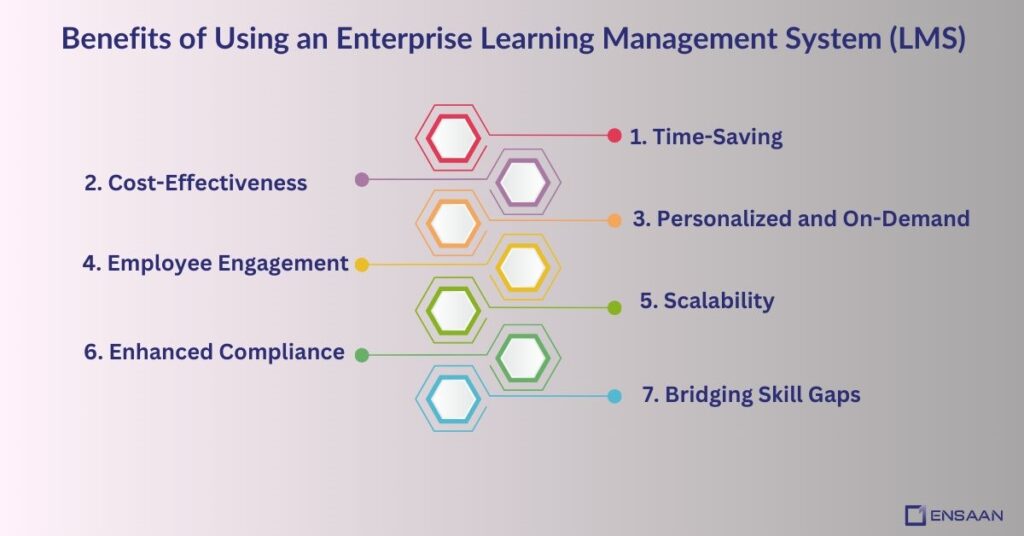
An LMS can transform how your organization manages training and development.
Not just another tool, eLearning is an integral component of an overall strategy to optimize learning, lower costs and enhance engagement across an enterprise.
Here’s a closer look at why LMSs are essential tools for organizations.
1. Time-Saving:
Traditional training typically involves managing stacks of manuals, juggling multiple spreadsheets and scheduling in-person sessions – taking up valuable hours in scheduling training activities and time commitment.
An LMS provides the solution by consolidating everything on one platform and streamlining processes.
Administrators can upload, update and organize training content easily while learners access materials whenever they suit them best.
Automation and centralization save both trainers and employees countless hours.
2. Cost-Effectiveness:
Training sessions held in-person are often costly affairs that involve venue rental costs, travel expenses and instructor fees.
All these costs can be dramatically decreased or eliminated with an LMS. Virtual training sessions allow employees to learn from any location, further reducing logistical expenses.
Furthermore, courses created can be reused and updated at no additional costs for long-term savings.
3. Personalized and On-Demand Learning:
Every learner has individual needs and schedules that vary an LMS allows learners to create personalized learning paths Custom specifically for them and their job roles and skill levels.
On-demand training enables employees to take classes when it is convenient for them, whether during work hours or outside working hours; making the process both flexible and effective.
4. Employee Engagement:
Modern LMS platforms often include features designed to make training enjoyable and interactive, such as badges, leaderboards and rewards that make training engaging and interactive.
Gamified employee engagement will increase employee motivation and encourage participation.
Quizzes, simulations and multimedia content keep students engaged while helping to strengthen knowledge retention.
5. Scalability:
An LMS provides seamless scalability. No matter if you need to train 50 employees or 5,000.
Launch new courses or training programs to accommodate growing teams or new hires without overburdening resources.
Scalability ensures a uniform training quality regardless of an organization’s size.
6. Enhanced Compliance:
Industries often have strict training requirements to ensure compliance with regulations.
An LMS can automate compliance training, track employee progress and generate reports to show adherence to industry standards saving both time and reducing penalties due to noncompliance.
7. Bridging Skill Gaps and Boosting Productivity:
An LMS helps identify skill gaps by conducting assessments and tracking progress over time.
By offering targeted training to address gaps, employees become more proficient at their roles and contribute to increased productivity.
Continuous learning equips teams with the capabilities needed to meet ever-evolving industry requirements.
Types of Enterprise LMS
Not all LMS platforms serve the same purpose. Depending on your organization’s needs, you can choose from the following types:
1. Traditional LMS:
These LMSs are intended to support internal employee training programs. Their primary function is onboarding, compliance and skill-development for staff within an organization.
Traditional LMS platforms are ideal for companies seeking to enhance internal workflows and employee performance.
2. Extended Enterprise LMS:
Extended Enterprise LMS platforms cater to external stakeholders like customers, partners, and vendors.
These systems help organizations train their extended networks, providing product education, customer onboarding, or partner certifications.
For example, a software company might use an Extended Enterprise LMS to train clients on using their tools effectively.
3. Cloud-Based LMS:
Cloud-based LMS platforms are hosted online and can be accessed from anywhere with an internet connection. These systems are easy to deploy and require minimal IT maintenance.
They’re highly scalable, making them a popular choice for growing organizations.
Cloud-based LMS platforms also support updates and integration seamlessly, ensuring they remain up to date with modern learning needs.
4. On-Premises LMS:
On-premises LMS platforms are installed locally on an organization’s servers.
These systems offer full control and customization but require significant IT resources for setup and maintenance.
They are a good option for companies with stringent data security requirements or those operating in industries with strict compliance needs.
Best Enterprise Learning Management System (LMS)
Here’s a detailed look at two leading Enterprise LMS platforms: Cornerstone and Saba, with their key features, best use cases, and pricing.
1. Cornerstone LMS:
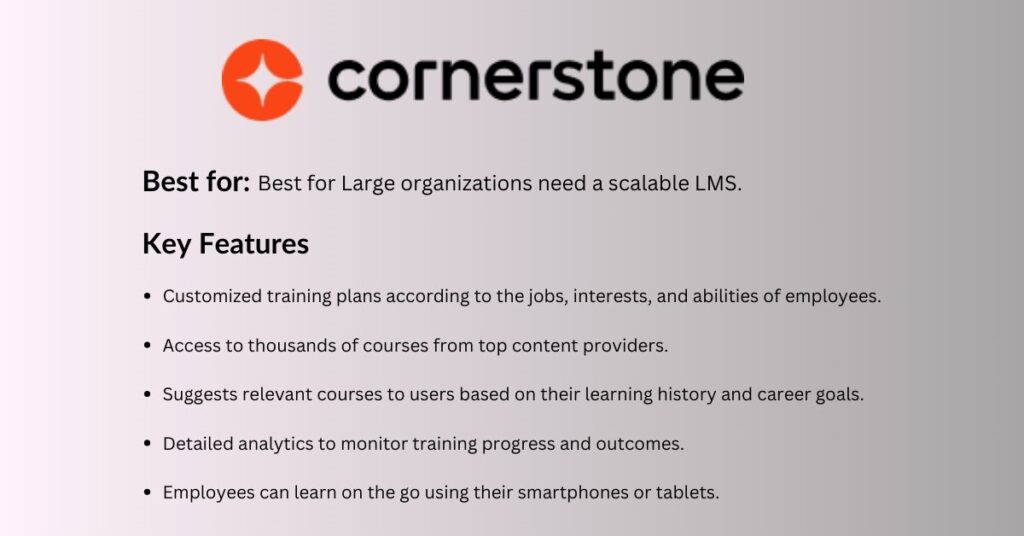
Cornerstone LMS is a popular LMS designed to support businesses with comprehensive training and development tools.
It’s known for its user-friendly interface, scalability, and ability to provide personalized learning experiences.
Key Features
- Personalized Learning Paths: customized training plans according to the jobs, interests, and abilities of employees.
- Content Marketplace: Access to thousands of courses from top content providers.
- AI-Powered Recommendations: Suggests relevant courses to users based on their learning history and career goals.
- Performance Tracking: Detailed analytics to monitor training progress and outcomes.
- Mobile Accessibility: Employees can learn on the go using their smartphones or tablets.
Best For
- Large organizations need a scalable LMS.
- Companies focusing on personalized learning and skills development.
- Businesses are looking for robust analytics and reporting tools to measure training success.
Pricing
Cornerstone LMS offers flexible pricing based on the organization’s size and specific requirements. Costs typically range from $6 to $15 per user per month, depending on features and the number of users. Custom pricing is available for enterprise-level needs.
2. Saba LMS:
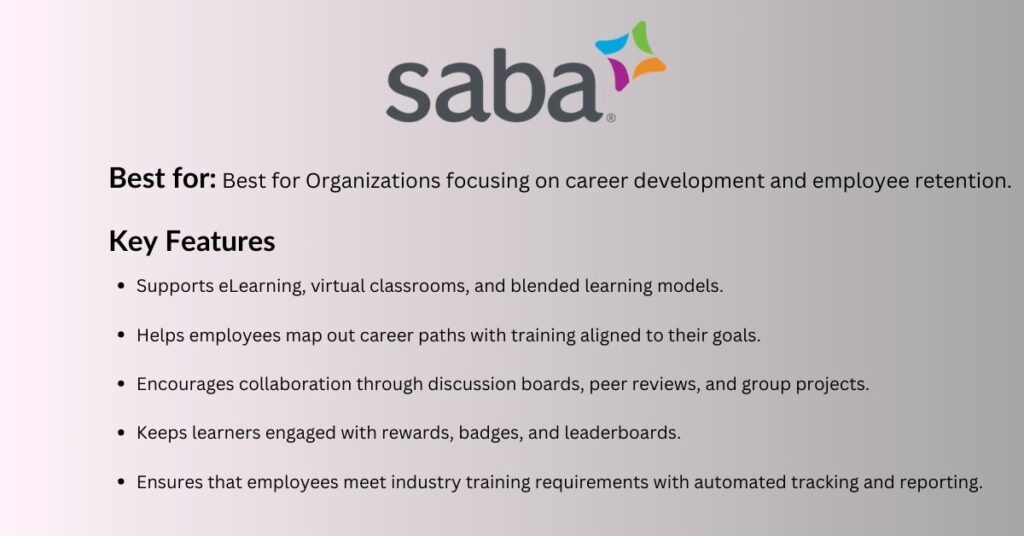
Saba LMS is a powerful platform designed to enhance employee learning and development.
It provides advanced tools for personalized training and career planning, making it ideal for organizations aiming to create a skilled and future-ready workforce.
Key Features
- Flexible Learning Formats: Supports eLearning, virtual classrooms, and blended learning models.
- Career Development Tools: Helps employees map out career paths with training aligned to their goals.
- Social Learning: Encourages collaboration through discussion boards, peer reviews, and group projects.
- Gamification: Keeps learners engaged with rewards, badges, and leaderboards.
- Compliance Management: Ensures that employees meet industry training requirements with automated tracking and reporting.
Best For
- Organizations focusing on career development and employee retention.
- Companies with complex compliance training needs.
- Businesses that value collaborative and social learning experiences.
Pricing
Saba LMS pricing is customized based on organizational size and needs. Generally, it starts at $4 to $12 per user per month, with additional costs for premium features like advanced analytics or integrations.
3. Docebo LMS:
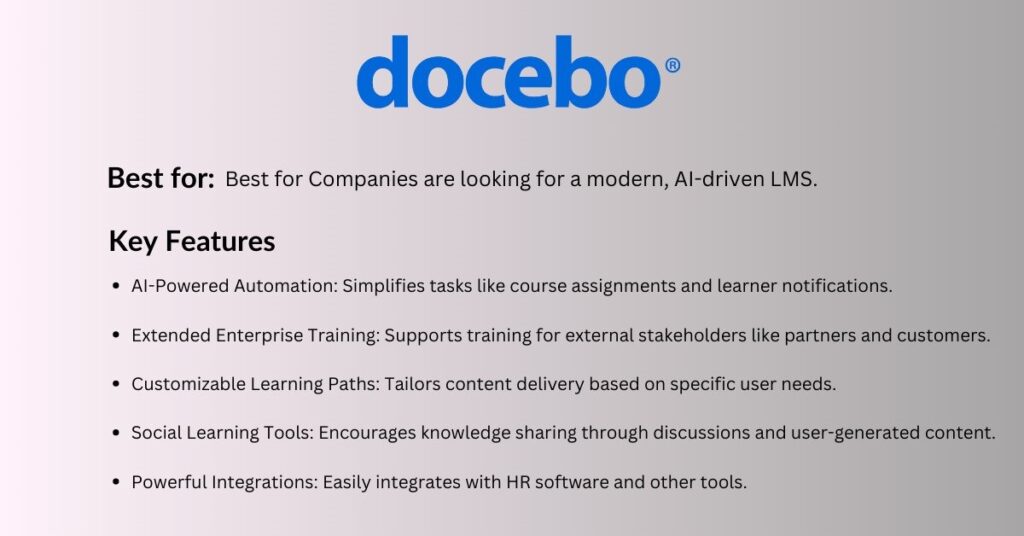
Docebo is a cloud-based LMS designed for businesses aiming to deliver exceptional learning experiences with modern, AI-powered tools.
Key Features
- AI-Powered Automation: Simplifies tasks like course assignments and learner notifications.
- Extended Enterprise Training: Supports training for external stakeholders like partners and customers.
- Customizable Learning Paths: Tailors content delivery based on specific user needs.
- Social Learning Tools: Encourages knowledge sharing through discussions and user-generated content.
- Powerful Integrations: Easily integrates with HR software and other tools.
Best For
- Companies are looking for a modern, AI-driven LMS.
- Organizations train both internal teams and external audiences.
Pricing
It starts at around $10 per user per month, with custom pricing for enterprise requirements.
4. SAP Litmos LMS:
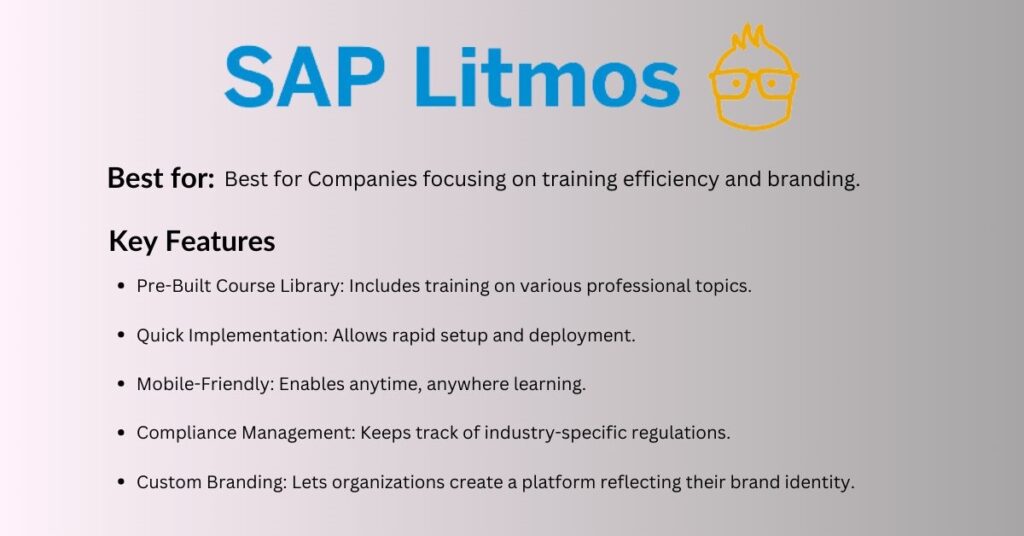
SAP Litmos is a versatile LMS offering pre-built courses and strong integrations, ideal for fast-growing companies.
Key Features
- Pre-Built Course Library: Includes training on various professional topics.
- Quick Implementation: Allows rapid setup and deployment.
- Mobile-Friendly: Enables anytime, anywhere learning.
- Compliance Management: Keeps track of industry-specific regulations.
- Custom Branding: Lets organizations create a platform reflecting their brand identity.
Best For
- Fast-growing businesses need a quick-to-deploy LMS.
- Companies focusing on training efficiency and branding.
Pricing
It starts at $6 per user per month, with enterprise pricing available for larger organizations.
5. TalentLMS:
5. Talent LMS:
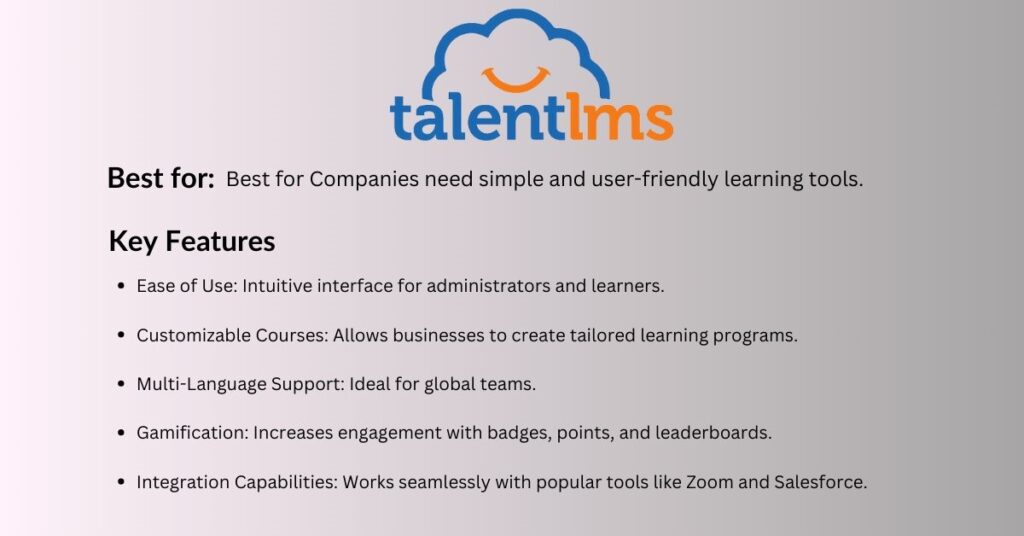
TalentLMS is a straightforward and budget-friendly LMS tailored for small to medium-sized enterprises (SMEs).
Key Features
- Ease of Use: Intuitive interface for administrators and learners.
- Customizable Courses: Allows businesses to create tailored learning programs.
- Multi-Language Support: Ideal for global teams.
- Gamification: Increases engagement with badges, points, and leaderboards.
- Integration Capabilities: Works seamlessly with popular tools like Zoom and Salesforce.
Best For
- SMEs and startups seeking a cost-effective LMS.
- Companies need simple and user-friendly learning tools.
Pricing
Free for up to 5 users, with paid plans starting at $69 per month for up to 40 users.
Why Choose EnsaanTech for LMS?
EnsaanTech is the perfect partner for your Learning Management System (LMS) needs because it combines innovation with simplicity.
With user-friendly tools, customizable features, and seamless integrations, EnsaanTech ensures that your training programs are effective and engaging.
Whether you’re onboarding new employees, enhancing team skills, or ensuring compliance, EnsaanTech provides a reliable and scalable solution tailored to your organization’s needs.
Plus, their excellent support team is always ready to help, making your learning journey smooth and hassle-free.

Conclusion
Choosing the right Enterprise LMS can transform your organization’s training and development efforts.
With platforms like Cornerstone, Saba, Docebo, SAP Litmos, and TalentLMS, businesses can improve learning experiences, save time, and reduce costs while keeping employees engaged.
EnsaanTech adds an extra layer of simplicity and innovation to ensure your LMS journey is smooth and effective. Start with the right LMS today and see the difference in how your teams grow and perform!
FAQ
An LMS is a software platform that helps organizations manage, deliver, and track training and learning activities.
An LMS saves time, reduces training costs, enhances engagement, and ensures consistent learning for employees or external audiences.
Cloud-Based LMS is hosted online and accessible anywhere, while On-Premises LMS is installed locally and offers full control but requires more IT resources.
TalentLMS is ideal for SMEs due to its user-friendly design and budget-friendly pricing.
EnsaanTech offers scalable, customizable, and user-friendly LMS solutions with excellent support, ensuring smooth implementation and effective learning outcomes.








